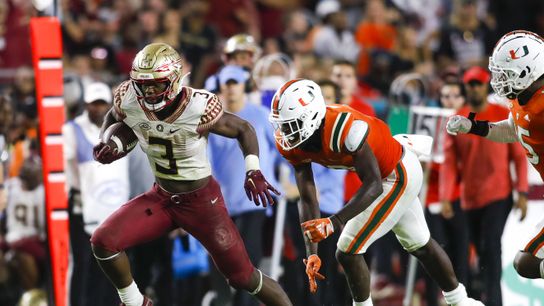The ACC is not breaking up. At least not any time soon.
Reports emerged from the conference's spring meetings in Amelia Island, Fla., that seven of the league's members (that's half) united in exploring the Grant of Rights contract in search of loopholes that would let them out. Whether those seven planned to then fight to the death over SEC/Big Ten invitations that may or may not have even materialized or breakaway to form an entirely new conference (similar to how the Mountain West was formed by breaking away from the WAC in a quarter century ago), we'll never know. Lawyers from all parties have apparently determined it's not worth the risk to try to bust out of the contract, because no one's leaving.
"The ADs and the universities are very unified," Florida State AD Michael Alford told ESPN. "So we're thrilled about being in this league, and we want to stay in it."
Earlier this year, Alford and Clemson's Graham Neff publicly lobbied for their schools to receive a larger cut than the rest of the conference, a move that many interpreted as a not-so-veiled threat toward the rest of the conference. From February:
“We have to do something,” FSU AD Michael Alford told the paper. “Because we are a brand, and we’re a very important brand, and we drive the media value in this conference.”
“Is it time revenue distribution within conferences, or at least the ACC, is done differently?" said Clemson's Graham Neff. "Yeah, I’ve been very active in those conversations within the league and continue to expect to take a leadership role in our desire for that to be a changed circumstance. Urgently.”
It seems progress was made on that front. The ACC Board of Directors will vote next week on a revenue sharing model that, while specifics are not clear, would likely grant a larger-than-usual cut toward schools who reach and advance in the College Football Playoff and NCAA Tournament. This eat-what-you-kill model seemed to have broad support across the conference.
ACC commissioner Jim Phillips says that there’s real excitement among the ACC Board members who have seen the new conference revenue-sharing models, including FSU president Richard McCullough.
— Curt Weiler (@CurtMWeiler) May 17, 2023
“We just have to look at revenue differently.”
Wake Forest’s Dave Clawson on idea of #ACC weighted revenue sharing: “If revenue distribution is based on investment in football, and on the field success, I think that'd be great. And I think Wake Forest would be very comfortable with that model.”
— Brandon Marcello (@bmarcello) May 16, 2023
However, Alford told ESPN he'd like to move the conference toward an unequal revenue sharing model. He's said in the past that Florida State is responsible for 15 percent of the conference's TV deal, but as one of 14 full-time members receives 7 percent of the revenue.
As it stands, the ACC is reportedly set to earn $43 million per team in 2023-24, a figure that places the conference ahead of the Big 12 and Pac-12 but well behind the SEC and Big Ten. The gap between the ACC and the Big Two is expected to grow over the course of their new TV contracts (the Big Ten just signed a deal with Fox, CBS and NBC; the SEC's all-in deal with ESPN begins next year) -- and, crucially, both conferences will go back to the negotiating table again before the ACC's all-in deal with ESPN expires in 2036.
Florida State AD Michael Alford said ACC discussing several revenue distribution options but admitted they won't get close to SEC or Big Ten numbers. "We're never going to cover the entire gap, but it will allow you to be competitive"
— Brett McMurphy (@Brett_McMurphy) May 16, 2023
"We have this gap, and the gap is just not about the money," Miami AD Dan Radakovich told ESPN. "It's about schools being able to take those dollars and translate it into potentially NIL opportunities for student athletes. So forget about the fact that you might go and steal a coach if you have more money. Now it's going to get better players. That's where the rubber hits the road."
So, are Florida State, Clemson, Miami and the rest happy to be in the ACC now that the conference is aware of its existential issues and will do everything within its power to change it, or are they resigned to the fact that they can't leave for another dozen years and have no choice but to make the best of it? Or is it both?
